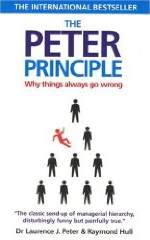Ever heard of the "Peter Principle"?
 "The Peter Principle" by Dr. Laurence J. Peter and Raymond Hull is a humorous treatise of the principle that "In a Hierarchy Every Employee Tends to Rise to His Level of Incompetence."
"The Peter Principle" by Dr. Laurence J. Peter and Raymond Hull is a humorous treatise of the principle that "In a Hierarchy Every Employee Tends to Rise to His Level of Incompetence."
It was first published in 1968, but the principle still valid in many cases. It holds that in a hierarchy, members are promoted as long as they work competently. Sooner or later they are promoted to a position at which they are no longer competent (their "level of incompetence"), and there they remain.
"In time, every post tends to be occupied by an employee who is incompetent to carry out his duties", they conclude, ""ork is accomplished by those employees who have not yet reached their level of incompetence".
The authors illustrate the principle with a multitude of examples, the level of incompetencies demonstrated in administrations, schools, companies and councils of sorts.
While the book is depressing at best in its black humour, there is a grain of truth. In every day situations, how many times are we not faced with organisations who can only think of one way to reward performance: through promotions.
Specifically technical departments often promotes technicians to managerial positions, for which the poor people have not the skills, qualifications nor training. The person is miserably, and the organisation suffers. But demotion is often not an option.
In that way, how many times have we turned "good technicians" into "bad managers"?
My advice: The art is to stop at "climbing up the corporate ladder", at your highest level of competency. Both you and the organisation will be grateful.
More about books on The Road.
 Peter. Flemish, European, aid worker, expeditioner, sailor, traveller, husband, father, friend, nutcase. Not necessarily in that order.
Peter. Flemish, European, aid worker, expeditioner, sailor, traveller, husband, father, friend, nutcase. Not necessarily in that order.
0 comments:
Post a Comment